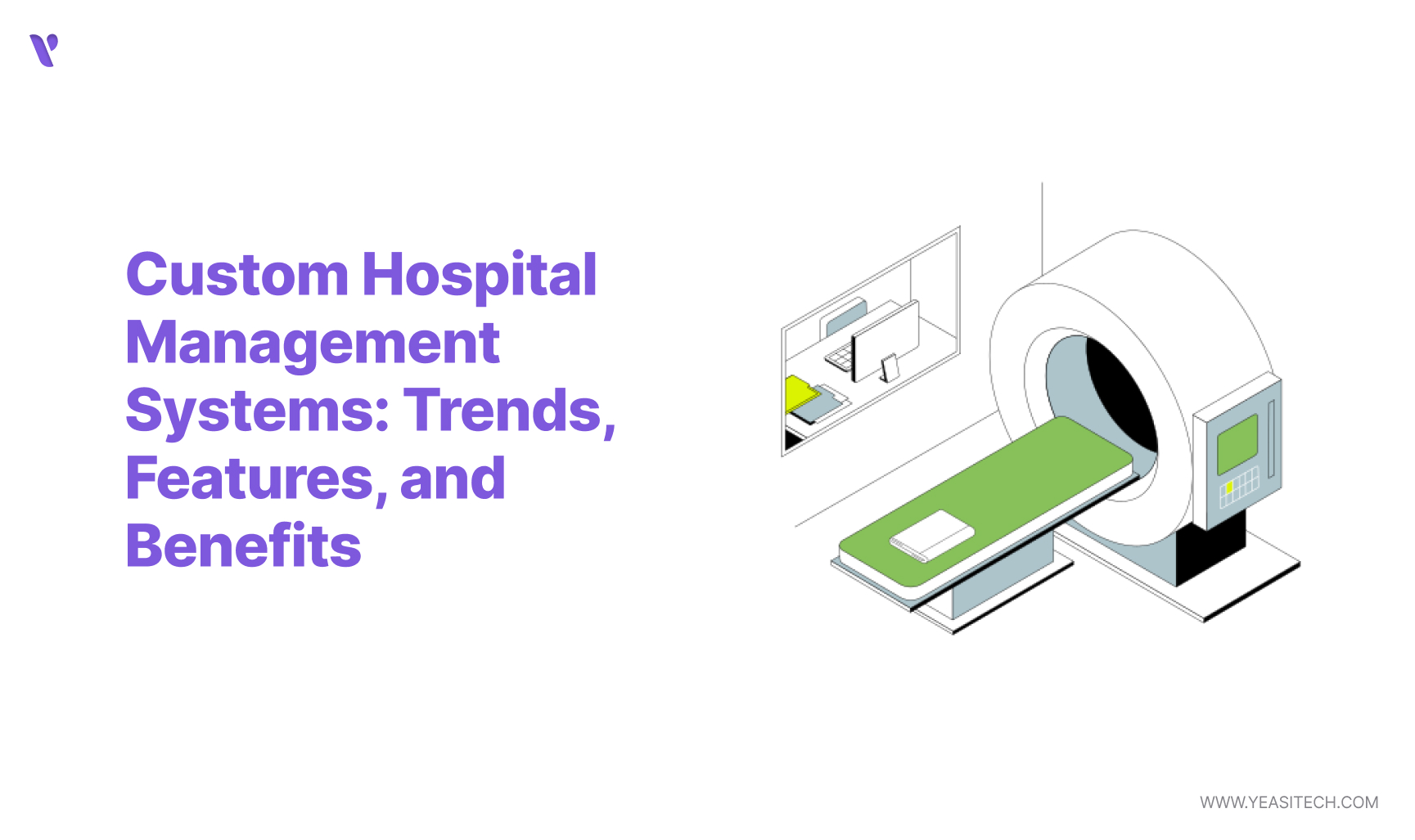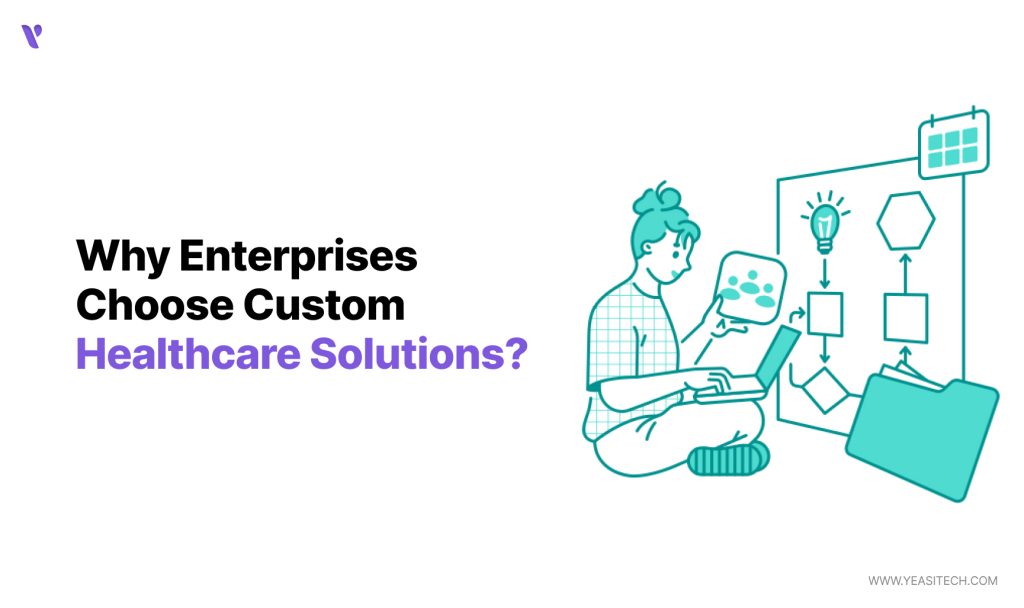Custom Hospital Management System for Enterprises in 2025

Technology is becoming more and more important in the dynamic healthcare sector as it helps to improve patient care, simplify processes, and minimize expenses.The demand for a custom hospital management system (HMS) has never been higher. Technological advancements, regulatory changes, and rising patient expectations necessitate a one-size-fits-all system’s demise.
This blog explores why custom HMS solutions are vital for premium enterprise clients, key features, costs, recent trends, and why YeasiTech is your ultimate partner in this journey.
Custom healthcare solutions are medical services that are specifically created to satisfy the needs of enterprise clients. These solutions cover a variety of services, such as concierge medicine, luxury home care, personalized wellness programs, and advanced medical technologies. The main objective is to offer a better patient experience that complies with the client’s medical needs and preferences.
Enterprise clients, such as large hospital chains and multispecialty healthcare providers, face unique challenges that cannot be addressed by generic HMS solutions. Here’s why a tailored solution is indispensable:
A well-designed custom HMS goes beyond basic hospital management to offer a suite of advanced features:
If you want to read more about the features of hospital management solutions, CLICK HERE!
Hospital management systems are at the forefront of the constantly changing healthcare technology sector. The following are some of the most significant developments influencing custom hospital management solutions in 2025:
Artificial intelligence (AI) has completely changed the healthcare industry. Custom hospital management solutions use AI for predictive analytics, automated diagnostics, and customized patient experiences.
The AI healthcare market is expected to develop at a CAGR of 40.1% to reach $120.2 billion by 2028, according to MarketsandMarkets.
The pandemic-induced surge in telehealth has become a permanent aspect of custom hospital management solutions.
Most healthcare providers offer telemedicine services and most custom hospital management solutions. systems include virtual consultation capabilities as per Telehealth and Medicine Today.
In the healthcare industry, data security is important. Blockchain guarantees safe, unchangeable patient records, safeguarding private data from security breaches.
Data security concerns have contributed to a 70% surge in blockchain adoption in healthcare since 2023, according to ResearchGate.
In order to provide proactive healthcare management, smart technologies such as wearables and Internet of Things sensors now immediately transmit real-time patient data into custom hospital management systems.
The global wearable medical devices market is expected to grow to $132 billion by 2030, driven by increased adoption of remote health monitoring tools, according to Fortune Business Insights.
Data-driven decision-making is essential in modern healthcare. Predictive analytics is used by enterprise hospitals to optimize staffing, detect patients who are in danger and manage resources.
One of the most important tools in customized treatment today is DNA testing. Medical practitioners can develop personalized treatments and food plans based on genetic predispositions by using genetic testing kits from firms such as Illumina and 23andMe.
Patients can access specialists on demand through virtual healthcare and concierge medicine. A study by Deloitte in 2022 showed that 62% of patients prefer telemedicine options for routine checkups.
Developing a premium custom hospital management system for enterprise requirements involves various components. The following figures are derived from the expertise of our software developers in developing similar apps and from industry norms in the field of IT.
| Features | Descriptions | Benefits | Estimated Cost Range |
| 1. AI-Driven Insights | AI analyzes patient data and hospital operations to predict outcomes and improve processes. | Healthcare professionals are improving patient care, optimizing resource usage, and making data-driven decisions. | $300-$1000 |
| 2. Telemedicine Integration | Users can enable remote consultation actions with doctors via video chat and file sharing. | Healthcare access improves and hospital visits decrease. | $300-$1,200 |
| 3. IoT Device Monitoring | Mobile and web access for patients to manage appointments, view lab results, and pay bills. | Healthcare providers improve patient safety and enable proactive healthcare delivery. | $300-$1,500 |
| 4. Custom Dashboards | Offers real-time dashboards with KPIs for administrators and department heads. | Improved visibility into hospital operations and better resource allocation. | $300-$1,800 |
| 5. Multi-Language and Localization | Supports different languages and compliance standards for global/regional use. | Broadens accessibility and ensures compliance with local regulations. | $1,000-$1,500 |
| 6. Blockchain for Data Security | Secures medical records with blockchain technology to prevent unauthorized access or tampering. | Enhanced trust, data integrity, and regulatory compliance (e.g., HIPAA, GDPR). | $1,200-$2,000 |
| 7. Patient Portals | AI-powered scheduling for staff, equipment, and rooms based on demand and availability. | Simplified patient engagement and reduced administrative workload. | $1,000- $2,000 |
| 8. Smart Scheduling | AI-Powered scheduling for staff, equipment, and rooms based on demand and availability. | AI-powered scheduling for staff, equipment, and rooms based on demand and availability. | $1,000-$2,500 |
| 9. Integration with Insurance Providers | Automates claims submissions, eligibility verification, and policy management. | Speeds up billing processes and ensures seamless insurance workflows. | $2,000 -$3,000 |
| 10. EHR Customization | Customized EHR modules to fit the specific needs of the hospital or healthcare organization. | Supports efficient patient data management and interoperability with external systems. | $1,000-$2,000 |
| 11. Advanced Analytics and Reporting | Provides detailed insights into patient trends, financial performance, and operational metrics. | Empowers strategic planning and improves hospital efficiency. | $1,200-$2,300 |
| 12. Emergency Response System | Alerts and emergency workflows for critical patient conditions or system outages. | Increases response speed and improves patient safety. | $1,000-$2,000 |
| 13. Mobile App Integration | Cross-platform mobile app for staff and patients to access key features like schedules and records. | Improves accessibility and communication between stakeholders. | $1,500-$2,500 |
Please get in touch with our team if you would like a customized software estimate. Our team will assess your needs as a business and as a product before presenting an elaborate cost estimate.
Custom hospital management systems (HMS) have a transformative effect, as proven by real-world examples. Two strong case studies showing their advantages are shown below:
Mayo Clinic, a top hospital in the U.S., created a custom system to fix delays in patient records, scheduling, and communication. Their new system:
As a result, patient care improved, hospital operations became smoother, and waiting times were cut down.
Cleveland Clinic, a world-famous healthcare provider, built a custom system to improve access to patient data and teamwork. Their system:
This led to quicker diagnoses, better treatment plans, and improved patient outcomes.
These examples show how custom hospital systems solve problems, improve efficiency, and make healthcare better for everyone.

Let’s read why enterprise clients opt for Custom Healthcare Solution in detail:
Custom hospital management systems have many advantages, but putting them into place can be difficult for healthcare organizations. They involve the following challenges:
Careful preparation, collaboration with competent partners, and a dedication to continuous instruction and support are necessary to meet these obstacles.
One of the best ways to improve healthcare operations is to create a unique Hospital Management System (HMS). However, is it better to outsource or create it internally? Outsourcing can guarantee high-quality solutions while saving money and time. The following are the reasons:
Outsourcing your HMS development helps you save time, cut costs, and get expert solutions. Pick the right outsourcing model, and your hospital will run smoother and more efficiently in no time!
YeasiTech is in a unique position to develop and deploy modern facilities and hospital management systems for enterprise clients because of our decades of experience in healthcare technology.
What Sets YeasiTech Apart?
For business clients hoping to maintain their market position in the healthcare sector in 2025, a customized hospital management system is now a necessity rather than a luxury. Hospitals can provide unmatched patient care, optimize operations, and easily comply with regulations because of these systems.
At YeasiTech, we specialize in developing custom HMS solutions that are suited to each enterprise client’s particular requirements. With our experience, creative thinking, and dedication to quality, YeasiTech is your reliable partner in revolutionizing healthcare operations.
Ready to revolutionize your hospital management? Contact YeasiTech today for a customized consultation and take the first step toward a smarter, more efficient future!
A Custom Hospital Management System is a tailored software solution designed to meet the unique operational, administrative, and clinical needs of large healthcare organizations, ensuring seamless integration, scalability, and enhanced patient care.
Custom HMS solutions provide better scalability, improved workflow efficiency, enhanced patient care, robust data security, and the ability to integrate with emerging healthcare technologies.
Key trends include AI and machine learning integration, cloud-based infrastructure, enhanced cybersecurity measures, interoperability with health systems, and patient-centric design innovations.
t automates administrative tasks, streamlines patient management, enhances resource allocation, and reduces errors through real-time data monitoring and AI-driven insights.
Custom HMS solutions provide better scalability, improved workflow efficiency, enhanced patient care, robust data security, and the ability to integrate with emerging healthcare technologies.
YeasiTech is a trusted IT service partner with 8+ years of experience, empowering 250+ businesses with scalable web, mobile and AI solutions.
Explore related topics to broaden your understanding and gain actionable insights that can transform your strategies.